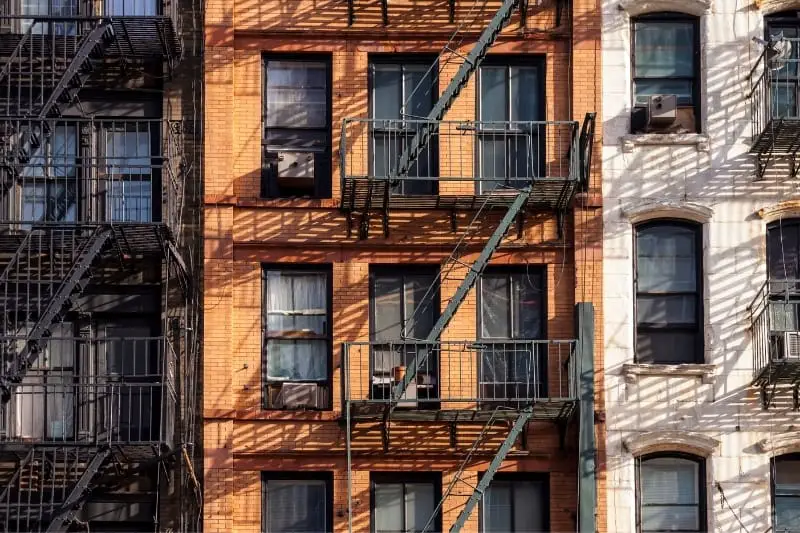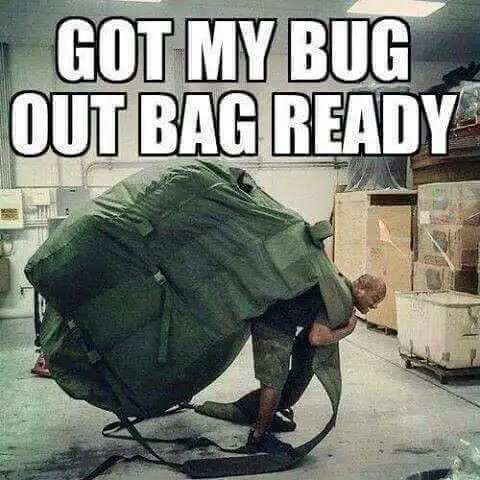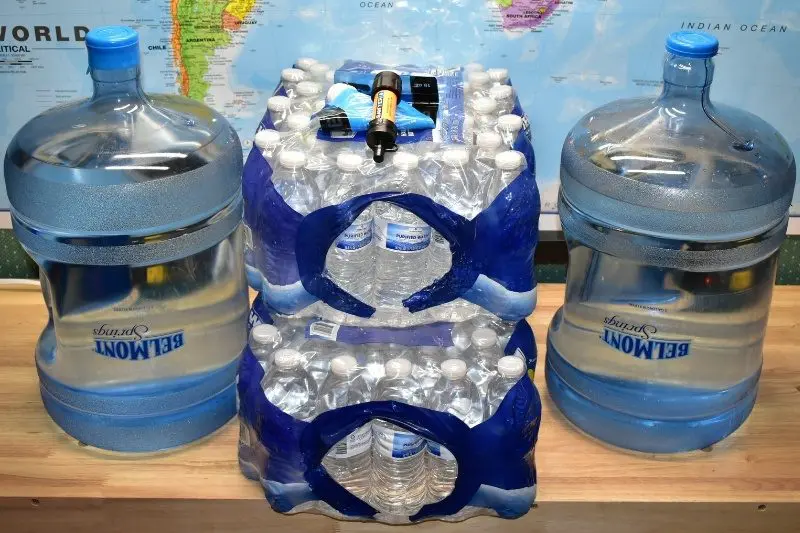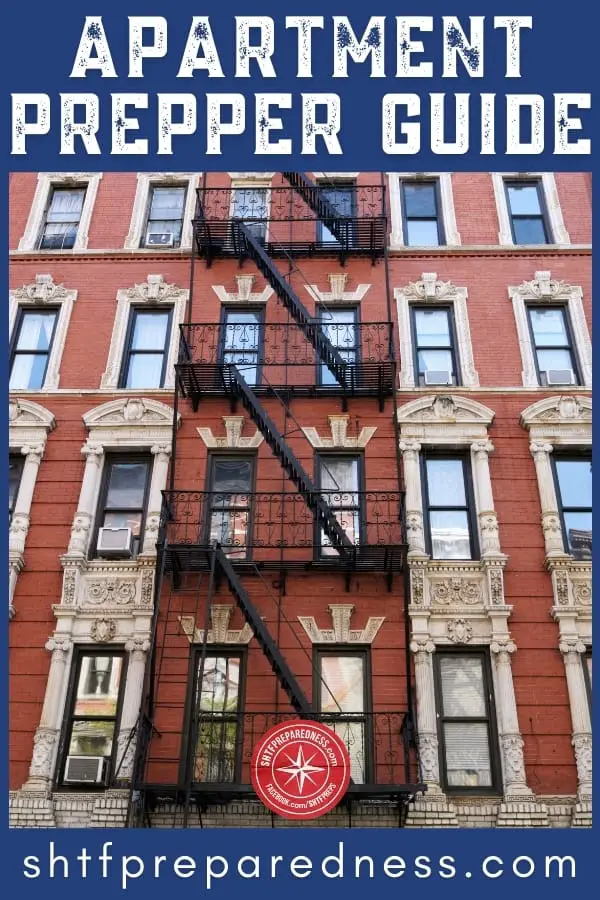SHTFPreparedness may collect a share of sales or other compensation from the links on this page.
How to Be a Prepper in an Apartment
The term ‘prepper’ usually conjures up images of those living on a rural homestead rather than an apartment. But there are preppers who live in cities or densely populated urban areas, too.
Urban preppers face unique challenges that those living out in the countryside don’t. Since there are more people per square foot, there’s a higher demand for resources and supplies. They also face the prospect of finding themselves in the midst of mass rioting and social unrest.
Things become even more complicated if you live in an apartment or condo where small space is an issue and you’re boxed in.
What can the aspiring apartment prepper do for disaster preparedness? We’ll discuss this today.

Apartment Prepper Survival Guide
These are the most important tips to remember as an apartment prepper:
Have a Bug Out Bag Ready to Go
Having a bug out bag ready to go is arguably the most important thing you can do as an apartment prepper. A bug out bag is simply a backpack acting as a survival kit that you could evacuate your apartment with to help you stay alive while you’re o the go.
The idea is to have enough gear to help you survive for a minimum of three days in the event that you bug out at a moment’s notice. Refer to our bug out bag checklist for reference.
Besides having a bug out bag, have a plan. Know exactly where to bug out to and at least three routes forgetting there from your location.

Storage Space Tips
It’s always easier to store items when you have lots of storage space, which you most likely don’t have in an apartment. This is why learning how to maximize limited storage is one of the most valuable skills to learn as a prepper.
To maximize storage space there are two things you can do.
First, remove any and all items from your apartment that you don’t use or don’t need to create more space.
Second, invest in a storage system such as shelf bin organizers and shelves that can stack over one another from the ground up to the ceiling. You’ll be surprised at how much storage space this creates.
Care For Pets
Never neglect your pets. Stockpile at least a week’s supply of food and any medicine for them (if applicable). Also stockpile extra water, small trash bags for waste, and litter boxes if you have a cat. For cats and smaller dogs have a carrier that you can place them in if you need to bug out.
Food and Water Storage

Have a week’s worth of water and non-perishable food at the bare minimum. A week should be long enough for most emergencies, but as we saw in 2020 with the lockdowns, certain situations can sometimes extend for much longer. So start with a week and build your stockpile from there if you have the space for it.
The food you stockpile should be food that is long-lasting and does not require freezing or refrigeration. When the disaster strikes, always consume the food in your freezer or refrigerator first, and especially if the power goes out.
Always store your water in a cool and dark location out of direct sunlight. Write down the date of the water storage and rotate it out once every year. This is one of the most important water storage tips to remember to avoid your water going bad.
Divide your stored water into two sections: one for personal hygiene and the other for safe drinking water. As a golden rule, expect to ration at least one gallon of water per person per day for drinking, hygiene, and cleaning purposes. That means you’ll need at least seven gallons of water per person a week, or thirty gallons a month, at the absolute minimum. Don’t forget to store extra for your pets as well.
Electricity and Power
It’s a good idea to always have alternative power sources as part of your preparedness survival plans. A power outage stemming from natural disasters or social unrest is a very real possibility.
Buy a small stove and grill that you could use for cooking or boiling water out on your balcony or patio, along with spare fuel or propane canisters. Think twice about having gas or propane or butane in the apartment. These are not advisable to use indoors due to the severe health risks they pose. Do all cooking or boiling outside on the balcony or patio.
Also, invest in candles (just keep a careful eye on children or pets to make sure they don’t fall over) and flashlights with plenty of spare batteries.
To stay warm in the winter, have lots of coats, gloves, wool socks, boots, blankets, and sleeping bags on hand. Never underestimate how freezing it can get in an apartment with no power in the thick of the winter.
Defense
Be prepared to defend your apartment if you bug in.
The front door is the most obvious entry point. As a result, your front door should be fortified first. Don’t count on standard door locks to keep out intruders. Invest in emergency door reinforcement you can install for your safety.
The windows are the next most obvious entry point. Set up blackout curtains so nobody can peer inside, and invest in steel window guards for further reinforcement.
Replacing your normal glass windows with more durable acrylic glass and your front door with a heavy-duty steel door makes your apartment even more defensible. However, these may not be allowed as a part of your lease.
Always have firearms ready for self-defense as well (if it’s illegal, use tasers, pepper spray, or anything else you can). When the grid goes down, keep a handgun on you at all times for easy access. Ensure your other firearms are loaded and kept in strategic locations too, such as on your nightstand, under your bed, behind the kitchen counter, or by the front door. It goes without saying that if you have kids use a gun safe.
Emergency Apartment Prepper Packing List
Here is a list of emergency preparedness supplies to pack if you live in an apartment:
- Batteries (assorted)
- Boots
- Five Gallon Bucket
- Emergency Survival Candles
- Cash ($100 minimum, divided into smaller bills)
- Coat
- Dried Food (1 week supply minimum)
- Duct Tape
- Flashlights (two minimum)
- Fire Extinguisher
- First Aid Kit
- Knife (fixed blade)
- Knife (folding blade)
- Lighter
- Maps
- Matches (waterproof)
- MRE’s (meals ready-to-eat, 1 week supply minimum)
- Multi-Tool
- Paracord
- Personal Documents (physical copies)
- Pet Food (1 week supply)
- Poncho
- Radio
- Sleeping Bag or Bivvy
- Storage Container(s)
- Stove (backpacking size – remember to always use next to a ventilated window to avoid carbon monoxide buildup)
- Toilet Paper
- Toolkit
- Towels
- Water (1 week supply, 1 gallon per person per day)
- Water Filter + Purification Tablets
Conclusion
That covers are essential tips for apartment preppers. The most important thing to do right now is to start stockpiling so you’re more prepared than your neighbors. Check out our free survival gear page for ideas on what to start stockpiling today.
